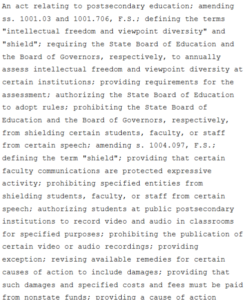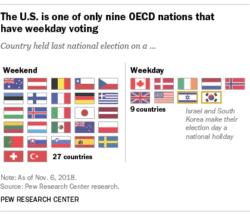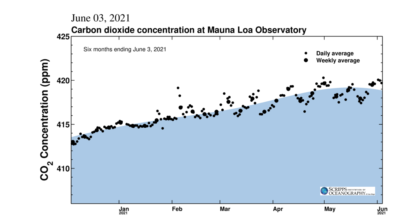 I’ve been looking at the text of Ron DeSantis’s new so-called anti-indoctrination bill which on closer examination might better be called the ‘Communist Protection Act’. This bill is a little different from several other recent actions by the Presidentially ambitious Florida Governor. Those other bills — such as the ban on non-Disney-owned social media who won’t give a free platform to politicians — involve providing a headline-grabbing symbolic action to “solve” a problem (or, in some cases, a non-problem). If the courts invalidate the action, all the better: the Governor gets to feed red meat to the base, and nothing actually happens — which keeps it from being a high-salience issue to others.
I’ve been looking at the text of Ron DeSantis’s new so-called anti-indoctrination bill which on closer examination might better be called the ‘Communist Protection Act’. This bill is a little different from several other recent actions by the Presidentially ambitious Florida Governor. Those other bills — such as the ban on non-Disney-owned social media who won’t give a free platform to politicians — involve providing a headline-grabbing symbolic action to “solve” a problem (or, in some cases, a non-problem). If the courts invalidate the action, all the better: the Governor gets to feed red meat to the base, and nothing actually happens — which keeps it from being a high-salience issue to others.
While it clearly has a red-meat vibe (“We’ll expose the liberal bias of higher education” or maybe “We’ll expose and drive out the pinko professors“), this bill is a little different, in that it actually does some stuff. In fact it does at least three things, but there is a good chance they may not work out quite like DeSantis and its proponents hope.
Broadly, the so-called anti-indoctrination bill does this:
- It makes universities a safe space for Nazis, racists, Communists, and Satanists
- It creates a right for higher education students to record their professors in class, although it is unclear as to whether and how this provision can be enforced.
- It creates extensive due process rights for students accused of violating campus conduct codes.
(1) In order to promote “intellectual freedom and viewpoint diversity” the ‘anti-indoctrination’ bill requires state higher education institutions to poll students and faculty on whether their campus is a safe space for varying ideological views:
The State Board of Education shall require each Florida College System institution to conduct an annual assessment of the intellectual freedom and viewpoint diversity at that institution. The State Board of Education shall select or create an objective, nonpartisan, and statistically valid survey to be used by each institution which considers the extent to which competing ideas and perspectives are presented and members of the college community, including students, faculty, and staff, feel free to express their beliefs and viewpoints on campus and in the classroom. The State Board of Education shall annually compile and publish the assessments by September 1 of each year, beginning on September 1, 2022. The State Board of Education may adopt rules to implement this paragraph.
Critics have noted that the bill text does not require that the poll be conducted anonymously, and fretted that therefore an ideological survey might be used against faculty in some way. Perhaps, for example, the tenure prospects of ideologically impure faculty would be diminished, much as happens in the People’s Republic of China. This fear that the State of Florida might emulate the Communist approach to higher education is of course far from ridiculous: not only are attacks against pointy-heads a long-running staple of stump speeches (remember Spiro Agnew?) but Republicans are very concerned that educated voters are increasingly unwilling to vote for them. Since Republicans are, by their definition (and thanks to Florida state electoral district gerrymandering, in fact), the ruling party, the turn away by the college-educated can only be a sign of college and university students falling victim to indoctrination — exposure to facts maybe? — on campuses.
But here’s one thing: commonly an “objective, nonpartisan, and statistically valid survey” would require only a sample of the population, not a survey of all of it. And commonly such a survey would be anonymous. And — key point — commonly, participation would be optional. One might reasonably expect that if the State Board of Education issues reasonable rules for the ‘survey’ it would follow this pattern.
Of course, in light of the Florida Board of Education’s recent decision to adopt Gov. DeSantis’s proposed rule banning the teaching of Critical Race Theory (it also bans “defin[ing] American history as something other than the creation of a new nation based largely on universal principles stated in the Declaration of Independence”) in the hotbed of wokeness that is K-12 education, one might plausibly doubt the capacity of the Board — largely appointed by DeSantis — to act in a reasonable and non-partisan manner.
Any attempt, however, to make university student or faculty participation in a campus survey mandatory could give rise to a compelled speech challenge under the First Amendment. This challenge would be especially valid if the Board required respondents to state something about their personal views rather than just about their views about general conditions on the campus. That said, not being a First Amendment specialist, I’m not 100% sure how this would fall out. On the one hand, the State of Florida could argue that the compulsion arises in the context of an employment relationship and hence ordinary First Amendment considerations are weaker. On the other hand, the courts have long been solicitous of the special circumstances of higher education. Both the 11th Circuit and now the Florida Supreme Court also are very conservative courts, which might help a compelled participation rule survive. But the U.S. Supreme Court seems to have a comfortable majority for strong free speech rights, so were the case to get that far I think the validity of compelling responses to any questions about the respondents’ personal ideological beliefs would be held unconstitutional.
But here’s another thing: despite the public spin, the statute does not actually authorize asking anyone about their personal ideological beliefs. Rather, it instructs that faculty and students be surveyed as to their view of “the extent to which competing ideas and perspectives are presented and members of the college community, including students, faculty, and staff, feel free to express their beliefs and viewpoints on campus and in the classroom.” In other words, the questions are supposed to be about whether respondents feel that they and others can uninhibitedly participate in a robust on-campus debate. Obviously, if respondents believe that some groups do not feel free to speak freely, academics and others would find it interesting to know more about what views the respondents feel are being squelched (Do misogynists feel inhibited by the presence of feminists? If so, is that a real problem?) — but there is no logical reason to think that those views need be their own. Politicians, however, might prefer not to know, as then they can draw their own conclusions (“Woke campuses are beating up on those poor, weak, downtrodden conservatives!“).
What are the views most likely to feel squelched on public university campuses today? Nazis, racists, Satanists, and Communists would be my bet. And as regards them (and others) the statute provides that,
The State Board of Education may not shield students, faculty, or staff at Florida College System institutions from free speech protected under the First Amendment to the United States Constitution, Art. I of the State Constitution, or s. 1004.097.
It’s a little weird to have DeSantis backing a bill that would make life so much easier for Nazis, racists, Satanists, and Communists (well, Nazis, Satanists, and Communists, anyway), but we live in strange times.
(2) The statute overrules any prohibition on students recording in-class activities:
[…] a student may record video or audio of class lectures for their own personal educational use, in connection with a complaint to the public institution of higher education where the recording was made, or as evidence in, or in preparation for, a criminal or civil proceeding. A recorded lecture may not be published without the consent of the lecturer
So students are to be encouraged to record classes in the hopes of bringing complaints within the college or university (to whom? on what grounds?) or lawsuits (based on what theory?) exposing the dreadful bias with which their professors are indoctrinating them, but the statute only creates a right to record for those purposes and no others; it even creates monetary penalties for otherwise disseminating the recording without permission. But if professors are frightened into not saying anything controversial, so much the better!
But one has to wonder how this can be enforced. The statute provides that a person “injured” by a violation of any of the rights in the section in which the student’s right to record a lecture appears, can “bring an action,”
Against a public institution of higher education based on the violation of the individual’s expressive rights in a court of competent jurisdiction to obtain declaratory and injunctive relief and may be entitled to damages plus court costs and reasonable attorney fees, which may only be paid from nonstate funds,
Does this create a right of action if a student is barred from recording a lecture? Arguably not: one straightforward reading of the above is that the right of action created here applies only to “expressive rights” as defined in the section. That reading gains strength from the creation of a separate right of action
Against a person who has published video or audio recorded in a classroom in violation of [the prohibition on publication of a recorded lecture without the consent of the lecturer] in a court of competent jurisdiction to obtain declaratory and injunctive relief and may be entitled to damages plus court costs and reasonable attorney fees, with the total recovery not to exceed $200,000.
If the right to record is not an “expressive right” that would seem make the right to record a right without a remedy. But the alternate reading is even worse: As regards the student’s right to record, what exactly is a compensable “injury” under the statute? The U.S. Supreme Court told us just this week that similar claims could not be brought for Fair Credit Reporting Act violations until and unless a person whose credit report falsely labelled them as being on a terrorist watch list could show some tangible, usually financial, injury because in the absence of that sort of injury there was no ‘case or controversy’ sufficient for a federal court to have jurisdiction. Whatever injury mighty exist for the credit bureau’s direct violation of a direct Congressional command was just too speculative to count. Surely wanting to record a lecture before it starts, in the hopes of capturing something actionable for which the remedies are unclear, is at least if not more speculative than thinking a credit reporting agency might share your inaccurate credit report.
Florida courts are not, however, bound by the U.S. Supreme Court’s definition of ‘case or controversy’ when it comes to enforcing state-law complaints, and it may be that they will take a more liberal view of standing. Indeed, the Florida Constitution’s Art I, § 21 guarantee that “The courts shall be open to every person for redress of any injury, and justice shall be administered without sale, denial or delay,” invites a broader interpretation. Ironically, the power of this part of the bill may turn on the state courts’ refusal to follow the conservative turn of the federal courts in tightening the ‘case or controversy’ requirement as an element of standing in order to block lawsuits seeking to vindicate individual rights. That said, there remains the problem of identifying what legal right even a very politically biased university lecture might violate. I can’t think of one — as opposed, say, to a lecture so bigoted that it creates a hostile environment, which would be actionable without recourse to this statute.
(3) Last, and I would think least controversially, the statute provides extensive due process protections for students and student organizations accused of violating campus codes of conduct. I imagine these are designed to protect conservative campus activists and provocateurs. That’s slightly odd given the conservative shibboleth that campuses suffer from a surfeit of left-wing attempts to shut down right-wing speakers. Is the idea to encourage and protect right-wing hecklers when liberals speak?
Perhaps the evil the legislature imagines it is curing is that of conservatives falling afoul of a nefarious left-wing campus ‘speech code.’ As I happen to think many if not most ‘speech codes’ in public universities are largely unconstitutional anyway, if that is its goal I don’t see this part of the statute as having much effect in the long run.
Whatever the motive, I don’t see a problem with requiring public universities to give notice of their policies and of claimed violations of them, to carry the burden of a preponderance of proof, and to permit accused students to have representation. I do, however, think the Communists and Satanists (and maybe union activists) will gain at least as much from this part of the statute as anyone else.
Note: the University of Miami is a private institution, so we are not covered by this bill.

 Today is the 5th anniversary of the UK’s decision to pull out the EU. I remain convinced that in the long run this will clearly be seen as one of the dumbest decisions a democracy ever made. Maybe not quite as dumb as electing Donald Trump, but one with much greater long-run consequences.
Today is the 5th anniversary of the UK’s decision to pull out the EU. I remain convinced that in the long run this will clearly be seen as one of the dumbest decisions a democracy ever made. Maybe not quite as dumb as electing Donald Trump, but one with much greater long-run consequences.

